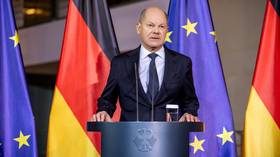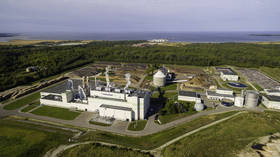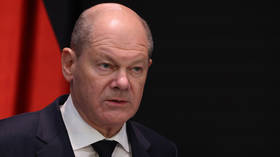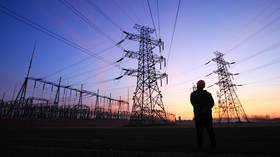This is utter madness!
Scholz calls for state of emergency in Germany

German Chancellor Olaf Scholz has called on the country’s parliament to declare a state of emergency over the Ukraine conflict. The head of government said he wants the constitutional ‘debt brake’ mechanism relaxed in order to ensure continued support for Kiev.
I suspect this is the very kind of madness for which the debt brake was adopted in the first place.
Enshrined in the German constitution, the limit dictates that the government cannot take on debts worth more than 0.35% of the country’s annual GDP. Temporary exceptions are allowed “in the event of natural disasters or exceptional emergency situations that are beyond the control of the state,” as long as the Bundestag supports the move. This, for instance, was done during the Covid-19 pandemic.
Speaking during a press conference on Thursday, Scholz said that the “Bundestag should adopt a resolution as soon as possible, whereby the war in Ukraine and its grave consequences for Germany’s and Europe’s security are classified as an emergency situation.” He explained that this would ensure that aid for Ukraine, “which is more important today than ever, no longer comes at the expense of the other duties that our state has to fulfill towards its own citizens.”
The chancellor added that US President Donald Trump is right to demand that European NATO member states shell out more for their defense, stressing that military-related spending “must grow considerably more.” Scholz dismissed the idea that the necessary funds could be obtained from the existing budget.
Speaking on the debt brake, the chancellor suggested permanently exempting defense spending from the limit.
OMG! There is nothing the War Industries would like better, and, indeed, are probably working frantically to bring about in all NATO countries.
Scholz welcomed President Trump’s phone call with his Russian counterpart, Vladimir Putin on Wednesday, stressing at the same time that the principle “nothing about Ukraine without Ukraine and nothing about Europe without Europe” should be respected.
According to the Kiel Institute for the World Economy, between January 2022 and October 2024, Germany provided Ukraine with €11 billion ($11.5 billion) worth of assistance, emerging as its second-largest backer after the US.
Meanwhile, amid the decoupling from relatively inexpensive Russian energy and several other factors, the German economy contracted for a second straight year in 2024 for the first time in more than two decades, according to a report released last month by the country’s federal statistics office Destatis.
Among the sectors bearing the brunt of the downturn is the country’s automotive industry.
Commenting on Scholz’s remark, former Russian President Dmitry Medvedev suggested that by highlighting his staunchly pro-Ukrainian stance, the German chancellor had struck a pose in stark contrast to US President Donald Trump’s position. Medvedev, who currently serves as the deputy chairman of Russia’s Security Council, opined that the German chancellor is hoping to thus score political points at home ahead of the February 23 snap general election, with his party projected to lose to its Christian Democratic Union rivals.
After Belgian Elections, a Move Rightward Promises to be Less anti-Israel
Belgium now has a new government, one that has replaced the previous left-wing coalition of the anti-Israel Socialist Party and Ecolo (the environmental party of the “Greens”) with a center-right coalition consisting of the N-VA Party (the New Flemish Alliance) and the French-speaking “Reform Movement.” The Belgian electorate has tired of the leftists who, when in power, instead of addressing the country’s domestic problems, including economic distress and the many problems caused by Muslim economic migrants who have cost Belgian taxpayers billions of dollars, have focused on foreign policy, and specifically, on the war in Gaza, where the government has displayed an extreme anti-Israel animus. More on the significance of the new government’s move from left to center-right for Belgian Jews, and for increased support for Israel, can be found here:
Belgium has a new government. What does it mean for the Jewish community and Israel? – opinion
by Henri Benkoski, Jerusalem Post, February 14, 2025:
After long months of discussions, Belgium has finally formed a new federal government. For the first time in a long time, the Socialist Party and Ecolo, the ‘Greens,’ are no longer in power. This represents a significant shift in Belgian politics.
A right-wing/center-right majority has now been established in the federal government and across other regional governments. The N-VA party (‘New Flemish Alliance’), led by Antwerp’s conservative and officially nationalist mayor, Bart De Wever, along with the liberal, French-speaking ‘Reform Movement’ under its young and effective president, Georges-Louis Bouchez, are now in power throughout the country….
The new federal government has moved away from the tendencies that willingly brought the Middle East conflict into Belgian politics, funding pro-Palestinian NGOs (and particularly the highly biased educational materials introduced into our schools, and advocating for the unilateral recognition of a Palestinian state with little to no criticism of Hamas or Hezbollah….
It appears the new federal government is adopting a more balanced stance, which comes as a relief. Bart De Wever and Georges-Louis Bouchez, from the Flemish N-VA and the French-speaking MR, respectively, are finally offering reassurances that their policies will be more impartial and honest, even leaning more towards being pro-Israel….
Bart De Wever and Georges-Louis Bouchez have assured Belgian Jews and other supporters of Israel that they are not going to continue the anti-Israel policies of the previous government, and suggest that they will be pro-Israel. No longer will the Middle East, and the Palestinians, be the center of the government’s attention, but instead the new government will focus, as it should, on ameliorating the economic conditions of ordinary Belgians.
The coming months will reveal the true political landscape of Belgium. The Belgian Jewish community eagerly awaits the change as it is united in its concern for Israel’s security and the fate of the hostages. We are tired of so much hatred and fear and look forward to a Belgium that is a haven for people of all faiths and cultures. The journey ahead will require continuous effort and vigilance to ensure that Belgium remains a beacon of hope and inclusivity in an increasingly polarized world.
That’s the hopeful view of Henri Benkoski, a leader of the Belgian Jewish community, and the founder of Radio Judaica. One thing is clear: Belgium is turning rightward, as is so much of Europe. Italy is now governed by the openly right-wing Giorgia Meloni; in France, Marine Le Pen has a real chance to come in first in the French presidential elections to be held in 2027; in Germany, the right-wing Alternativ für Deutschland party, under the leadership of the formidable Alice Weidel, is widely predicted to have its best showing yet in the elections to be held on February 23. The AfD is the party whose main issue is Muslim immigration. The party calls for a halt to that immigration, though it does not object to non-Muslim immigrants, and for deporting Muslims already in Germany back to their countries of origin.
Like Marine Le Pen, Giorgia Meloni, and Alice Weidel, the government of Bart De Wever and Georges-Louis Bouchez offers the promise of three things: first, more attention to domestic matters, especially the growing threat to the economy and physical security posed by Muslim immigration; second, an end to the previous fixation on Gaza and Israel’s putative misdeeds; third, a distinctly pro-Israel policy. A roar of approval, please, from Leo Belgicus, for the new government in Brussels.
Vital pulp mill shuts after Estonia after Baltics disconnect from Russian grid

Estonia’s largest pulp mill has halted production due to skyrocketing electricity prices after the Baltic nation disconnected from the Russian-Belarusian energy network (BRELL) and synchronized with the EU’s grid, news outlet Delfi has reported.
BRELL was originally part of the unified Soviet energy system and remained in operation after the USSR’s collapse in 1991, connecting Belarus, Russia, Estonia, Latvia, and Lithuania. Under a 2001 agreement, the five countries committed to sharing electricity and providing mutual support during power emergencies. Earlier this month, the Baltic states severed their ties with BRELL and integrated with the EU’s network.
The move sparked a massive surge in electricity prices in the three Baltic countries. Last week, the average daily price almost doubled from €126 ($131) to €230 ($240) per megawatt-hour, while peak hours saw prices up to €483 ($505) per MWh, according to the Nord Pool exchange.
The sudden price spike forced Estonia’s largest energy consumer, pulp mill Estonian Cell, to suspend production.
“We stopped production on Tuesday, and now we wait for the next day’s price every day at lunchtime,” Estonian Cell chief financial officer Meelis Kuzma told Delfi Business last week.
Although representatives from Elering, Estonia’s power operator, blamed the price hike on weather conditions and market dynamics, the increase came soon after the country disconnected from the Russian power grid.
The power operator noted reduced wind energy production, increased consumption due to colder weather, and a rise in gas prices as key factors influencing the surge.
“The fact that the price of electricity depends on the weather and thus affects our production is actually absurd!” Kuzma argued.
Estonian Cell has faced significant financial challenges in recent years due to the volatility of energy prices, and has suspended production several times because of soaring electricity prices.
Estonia, Latvia, and Lithuania – all NATO members – have stopped electricity supplies from Russia since the escalation of the Ukraine conflict in 2022, although they maintained their connection to the BRELL grid. The Baltic countries now have to purchase reserve capacity on their own.
Elering said earlier that in 2025, the Baltic states will require around 1,500 MW of balancing capacity, with demand expected to rise amid growing consumption. While most residents in the Baltic countries pay fixed electricity tariffs, price hikes have primarily hit businesses and industries.






No comments:
Post a Comment